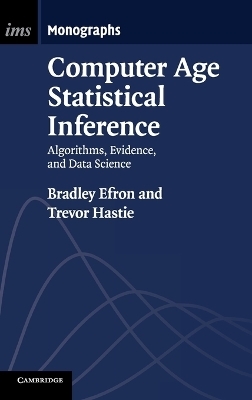
Computer Age Statistical Inference
Cambridge University Press (Verlag)
978-1-107-14989-2 (ISBN)
The twenty-first century has seen a breathtaking expansion of statistical methodology, both in scope and in influence. 'Big data', 'data science', and 'machine learning' have become familiar terms in the news, as statistical methods are brought to bear upon the enormous data sets of modern science and commerce. How did we get here? And where are we going? This book takes us on an exhilarating journey through the revolution in data analysis following the introduction of electronic computation in the 1950s. Beginning with classical inferential theories - Bayesian, frequentist, Fisherian - individual chapters take up a series of influential topics: survival analysis, logistic regression, empirical Bayes, the jackknife and bootstrap, random forests, neural networks, Markov chain Monte Carlo, inference after model selection, and dozens more. The distinctly modern approach integrates methodology and algorithms with statistical inference. The book ends with speculation on the future direction of statistics and data science.
Bradley Efron is Max H. Stein Professor, Professor of Statistics, and Professor of Biomedical Data Science at Stanford University, California. He has held visiting faculty appointments at Harvard University, Massachusetts, the University of California, Berkeley, and Imperial College of Science, Technology and Medicine, London. Efron has worked extensively on theories of statistical inference, and is the inventor of the bootstrap sampling technique. He received the National Medal of Science in 2005 and the Guy Medal in Gold of the Royal Statistical Society in 2014. Trevor Hastie is John A. Overdeck Professor, Professor of Statistics, and Professor of Biomedical Data Science at Stanford University, California. He is coauthor of Elements of Statistical Learning, a key text in the field of modern data analysis. He is also known for his work on generalized additive models and principal curves, and for his contributions to the R computing environment. Hastie was awarded the Emmanuel and Carol Parzen prize for Statistical Innovation in 2014.
Part I. Classic Statistical Inference: 1. Algorithms and inference; 2. Frequentist inference; 3. Bayesian inference; 4. Fisherian inference and maximum likelihood estimation; 5. Parametric models and exponential families; Part II. Early Computer-Age Methods: 6. Empirical Bayes; 7. James–Stein estimation and ridge regression; 8. Generalized linear models and regression trees; 9. Survival analysis and the EM algorithm; 10. The jackknife and the bootstrap; 11. Bootstrap confidence intervals; 12. Cross-validation and Cp estimates of prediction error; 13. Objective Bayes inference and Markov chain Monte Carlo; 14. Statistical inference and methodology in the postwar era; Part III. Twenty-First Century Topics: 15. Large-scale hypothesis testing and false discovery rates; 16. Sparse modeling and the lasso; 17. Random forests and boosting; 18. Neural networks and deep learning; 19. Support-vector machines and kernel methods; 20. Inference after model selection; 21. Empirical Bayes estimation strategies; Epilogue; References; Index.
| Erscheinungsdatum | 23.07.2016 |
|---|---|
| Reihe/Serie | Institute of Mathematical Statistics Monographs |
| Zusatzinfo | 50 Tables, black and white; 40 Line drawings, color; 5 Line drawings, black and white |
| Verlagsort | Cambridge |
| Sprache | englisch |
| Maße | 158 x 236 mm |
| Gewicht | 930 g |
| Themenwelt | Geisteswissenschaften ► Psychologie ► Test in der Psychologie |
| Informatik ► Theorie / Studium ► Künstliche Intelligenz / Robotik | |
| Mathematik / Informatik ► Mathematik ► Statistik | |
| Studium ► Querschnittsbereiche ► Epidemiologie / Med. Biometrie | |
| Sozialwissenschaften ► Soziologie | |
| Wirtschaft ► Volkswirtschaftslehre ► Ökonometrie | |
| ISBN-10 | 1-107-14989-4 / 1107149894 |
| ISBN-13 | 978-1-107-14989-2 / 9781107149892 |
| Zustand | Neuware |
| Haben Sie eine Frage zum Produkt? |
aus dem Bereich


